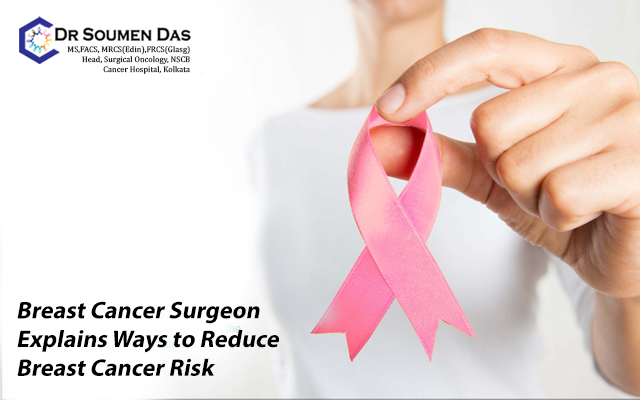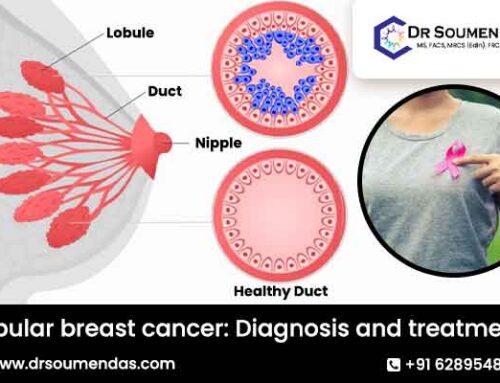Breast cancer is a disorder in which cells in the breast grow out of control. Breast cancer can arise in numerous breast regions, including – lobules, ducts, and connective tissue.
The lobules are the glands that develop milk. The ducts are tubes that transport milk to the nipple. The connective tissue (which comprises fibrous and fatty tissue) surrounds and binds everything. Most breast cancer begins in the ducts or lobules.
In this post, Dr. Soumen Das, a breast cancer surgeon in Kolkata, explains the various risk factors and ways you can lower the chances of developing breast cancer.
Risk Factors for Breast Cancer
According to studies, multiple variables contribute to your breast cancer risk. Being a woman and aging are the two primary characteristics influencing your risk. The majority of breast cancers are diagnosed in women aged 50 or older.
The risk factors can be divided into preventable and non-preventable.
Non-preventable Risk Factors
- Getting older – Breast cancer risk rises with age. The majority of breast cancers are detected after age 50.
- Mutations in genes – Women who inherit mutations in specific genes, such as BRCA1 and BRCA2, have an increased risk of developing breast and ovarian cancer.
- Reproductive background – Women who begin menstruation before the age of 12 or menopause after 55 are exposed to hormones for a more extended period, which increases their risk of developing breast cancer.
- Having dense breasts – Dense breasts contain more connective tissue making it difficult to detect tumors on mammograms (an X-ray picture of the breast employed to look for early signs of breast cancer.) Women with dense breasts have a heightened risk of developing breast cancer, says the breast cancer surgeon in Kolkata.
- Personal history of breast cancer or non-cancerous breast diseases – Women with a personal history of breast cancer are likely to develop the disease again. Certain non-cancerous breast diseases like atypical hyperplasia and lobular carcinoma in situ are associated with an increased risk of developing breast cancer.
- A history of breast or ovarian cancer in the family – A woman’s risk of developing breast cancer is increased if she has a first-degree relative, such as a mother, sister, or daughter, or several family members on either her mother’s or father’s side who have had breast or ovarian cancer. A woman’s risk is also increased if she has a male first-degree relative with breast cancer.
- Previous radiation therapy treatment – Women who received radiation therapy to the chest or breasts before 30 are highly likely to develop breast cancer later in life.
Preventable Risk Factors
- Lack of physical activity – Lack of physical activity increases the risk of breast cancer in women.
- Being overweight or obese following menopause – Overweight or obese older women have a greater risk of developing breast cancer than their normal-weight counterparts.
- HRT – Some forms of hormone replacement therapy (those containing both estrogen and progesterone) taken for more than five years during menopause may increase the risk of breast cancer. Certain oral contraceptives (birth control pills) have also been found to increase the risk of developing breast cancer.
- Reproductive background – First pregnancy after age 30, lack of breastfeeding, and never having a full-term pregnancy can increase the risk of breast cancer.
- Alcohol consumption – Studies indicate that a woman’s risk of developing breast cancer increases as alcohol consumption increases.
Research also suggests additional risk factors for breast cancer, including smoking, exposure to cancer-causing chemicals, and changes in other hormones due to night shift work.
Tips to Reduce Breast Cancer Risk Factors
Many factors can influence a woman’s breast cancer risk throughout her lifetime. Some factors, such as age or family history, cannot be changed. However, according to Dr. Soumen Das, a breast cancer doctor in Kolkata, you can reduce your risk of breast cancer by taking care of your health in the following ways:
- Maintain a healthy weight.
- Exercise regularly.
- Limit or abstain from drinking alcoholic beverages.
- If you are taking or have been prescribed hormone replacement therapy or oral contraceptives (birth control pills), discuss the risks with your doctor and determine if the treatment is appropriate for you.
- If possible, breastfeed your infants.
- If you have a history of breast cancer in your family or inherited mutations in your BRCA1 and BRCA2 genes, speak with your doctor about alternative risk reduction strategies.
Maintaining good health throughout your life will reduce your risk of developing cancer and increase your chances of surviving the disease if it does occur.
If you fall under any category of risk factors and are over the age of 40, consult your doctor about starting breast cancer screening. Remember, early detection of breast cancer can improve the outcome of breast cancer treatment in Kolkata.







Leave A Comment